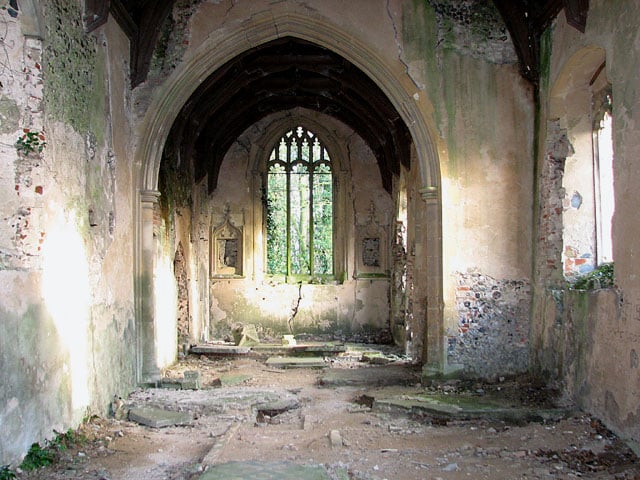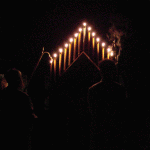
Graham Greene’s novel The End of the Affair chronicles the passionate love affair between the writer, Maurice Bendrix, and the married wife of a civil servant, Sarah Miles. Although we might surmise that the end of their affair would also involve the end of their love, Greene surprises us by having God intervene between two lovers who continue to love each other until the end. As we follow Sarah through her painful journey of renouncing the man she loves for the sake of a promise to God, we are reminded that God is also a Lover–one who strips away anything that interferes with our love for Him. This brings to mind St. John of the Cross’s idea of a “dark night of the soul” in which the denying of all pleasure and consolation is a path to sanctity:
This dark night is an inflow of God into the soul, which purges it of its habitual ignorances and imperfections, natural and spiritual, and which the contemplatives call infused contemplation or mystical theology. Through this contemplation, God teaches the soul secretly and instructs it in the perfection of love without its doing anything or understanding how this happens … by both purging and illumining, this contemplation prepares the soul for union with God through love.[1]
In fact, Greene directly references The Dark Night in The End of Affair. Bendrix describes his love for Sarah in mystical terms, directly inviting us to contemplate the role of St. John’s idea of the “dark night” in the novel:
The words of human love have been used by the saints to describe their vision of God, and so, I suppose, we might use the terms of prayer, meditation, contemplation to explain the intensity of the love we feel for a woman. We too surrender memory, intellect, intelligence, and we too experience the deprivation, the noche oscura, and sometimes as a reward a kind of peace.[2]
But every human love is, on some level, a reflection of a divine reality. Although Bendrix may have loved Sarah on a profoundly spiritual level despite his atheism, it was necessary for God to tear away their love for each other in order to lead them to Himself. When a bomb strikes the building where Sarah and Bendrix are meeting during an air raid, Sarah thinks that Bendrix has died and makes a bargain with the God that she does not believe in: she will give her lover up if God miraculously restores his life. Both Sarah and Bendrix experience a “dark night” in the period following their separation. While Bendrix does not know why Sarah ended the affair and consequently turns to hatred as a remedy for his pain, Sarah is forced to confront her unbelief. Sarah experiences the inner turmoil caused by the tension between her love for Bendrix, her vow, and her lack of faith, saying, “You can’t have a merciful God and this despair … but, dear God, what shall I do with this desire to love?”[3] The suffering that Sarah undergoes as result of her longing for Bendrix purges her heart in preparation for love of God, because she needs to love someone even in the middle of what she terms “the desert,” the end of human love.[4] Sarah is illumined by the light of faith by finding God in her “desert.”
Yet the novel does not end merely with Sarah’s confession of faith. Although Sarah has encountered God in the “desert,” He still must rebuild her heart for Him alone, leading her to experience the second darkness: the purification of the intellect. Thus, though the dark night begins by purging the soul of worldly attachments, it ends by overwhelming the intellect with God’s own light. We see how God engulfs Sarah’s mind and heart at the moment when she formally confesses her belief. Rather than praying for faith, she now prays for God to transform her:
Dear God, I’ve tried to love and I’ve made such a hash of it. If I could love you, I’d know how to love them … Teach me to love. I don’t mind my pain. It’s their pain I can’t stand. Let my pain go on and on, but stop theirs. Dear God, if only you could come down from your Cross for a while and let me get up there instead. If I could suffer like you, I could heal like you.[5]
Her prayer marks a dramatic shift in Sarah’s thought. The unbelieving woman who rebelliously kept her vow while longing for her lover now begs God for even more pain. With her newfound faith, Sarah has come to realize that to be in love with God is to suffer. She writes, “Dear God, I’m still no use. I’m still the same bitch and fake. Clear me out the way.”[6] As the “dark night” illuminates the stains of guilt on Sarah’s soul, she experiences the agony of longing and unworthiness. Sarah’s words remind us that for Christ to assume us completely into His love, He must utterly fill our minds, thoughts, and desires, ravishing our selfish human identity. And to lose our fallen identity in Christ entails losing all that we are, so that He can make us fully human. Christ’s act of love consisted in being nailed to a cross, crying out in utter abandonment. Sarah’s union with God is no different. She is forced to nail her love to the cross, and consequently, her very being.
While Greene’s reliance on St. John’s theology is clear, he transforms it by emphasizing the necessity of human love as a prerequisite for divine love in Sarah’s conversion. The love affair could not have ended unless it had begun, and Sarah could not have experienced the purgation needed to love God unless she first held something precious that she could lose. Moreover, Sarah had to experience true love in a bodily way before she was able to experience the spiritual reality of God’s love. We “see through the mirror darkly,” not face-to-face.[7] Because spiritual truths must be mediated through physicality, the human body translates God and His love in a way that the human can comprehend. The danger of human love occurs when we rest in the bodily reality as the final end. When God strips us of physical attachments, He clears the mirror of sin’s smudges to purify our vision of Him. In her last letter to Bendrix, Sarah tells him, “You took away all my lies and deceptions like they clear a road of rubble for somebody to come along it, somebody of importance, and now he’s come, but you cleared the way yourself.”[8] Thus Sarah experiences “infused contemplation” as a result of God “teaching [her] soul secretly” through the character of Bendrix.[9]
***
Footnotes:
[1] St. John of the Cross, The Dark Night in Collected Works of St. John of the Cross, trans. Kieran Kavanaugh and Otilio Rodriguez, Washington, D.C.: ICS Publications, 1991), 401.
[2] Graham Greene, The End of the Affair, (New York: Penguin Books, 2004), 36.
[3] Ibid., 74.
[4] Ibid., 72.
[5] Ibid., 96.
[6] Ibid., 97.
[7] The Holy Bible, Revised Standard Version, Second Catholic Edition, (Ignatius Press: San Francisco, 2006), 1 Corinthians 13:12.
[8] The End of the Affair, 121.
[9] The Dark Night, 401.













